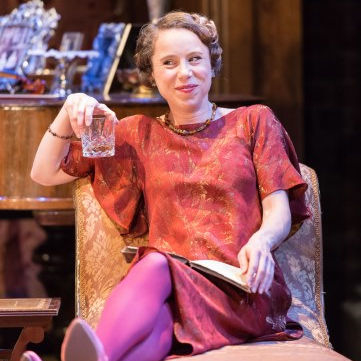Love's Labour's Won (RSC)
Exploring the idea that Much Ado about Nothing is in fact the lost Shakespeare play Love's Labour's Won was always going to be a contentious one. On the basis of this production, I am far from convinced by their belief that Much Ado is the sequel to Love’s Labour’s Lost.
Yes, there are superficial similarities between the relationships of Berowne/Rosaline and Benedick/Beatrice but that, for me, is as far as it goes. Other than giving this production the same physical location as the new sparkling production of Love’s Labour’s Lost, the creative team do little to persuade that the two texts have anything particular in common. As many theatregoers will just see one or the other, I do not see this as much of a problem and credit has to be given to the company for trying to make the case.

© Manuel Harlan
The play is set after the end of the First World War with soldiers returning to recuperate in a large country house. Sadly the production fails to exploit this beyond the opening scene. A missed opportunity to explore how war impacted both those at the front and those left at home – meaning that the setting feels tacked on rather than fully integrated into the central concept.
The setting also creates some confusion as to the status of a number of characters. By playing Borachio as a member of Leonato's household, this fails to explain how or why he is so closely allied to Don John. Similarly having Ursula and Margaret as housemaids could work until the point at which they are seen dancing with the house guests in Act 2 – something that would never happen in a country house at that time. It is a lack of attention to detail in areas such as this that undermines the success of the production overall.
The strength of the text is in the delicate balance between the comic and dramatic scenes. From the high farce of the gulling of Benedick to the emotional power of the Act 4 chapel scene, it's a masterpiece of construction.
But the production does again slightly misfire. Edward Bennett works incredibly hard to create a lively and likeably buffoonish Benedick but the gulling scene is completely overplayed. There is no denying that the scene gets laughs but as WS Gilbert famously noted to George Grossmith, who objected to a funny moment being cut even though it generated a large laugh, "So you would if you sat on a pork-pie". Less is very often more in a scene like this.
The Chapel scene has some strong moments – particularly, a beautifully spoken performance of Friar Francis by Jamie Newall and a heart-rending Hero from Flora Spencer-Longhurst. But I was not convinced by the dynamic between Bennett and his Beatrice (Michelle Terry). Terry is a very winning Beatrice in many ways – her independence and unconventionality are brought out to the full – but their interchange in the chapel does not hit the right emotional notes for it to be completely persuasive.
Christopher Luscombe's production is undeniably beautiful to look at and there is no doubting the warmth of the audience reaction but, for me, it does not rate highly as an overall interpretation. The lightness of touch that I so enjoyed with the same company’s work on Love’s Labour’s Lost is just not in evidence.










